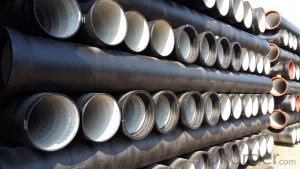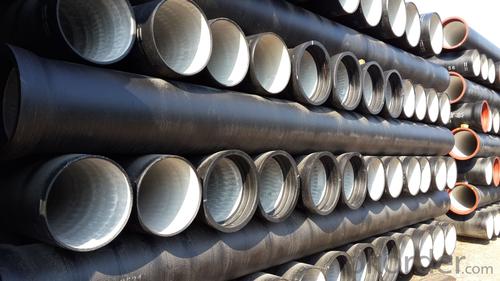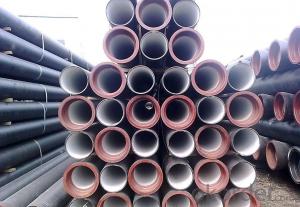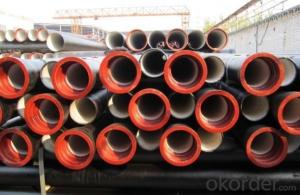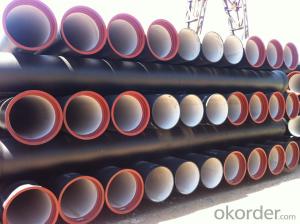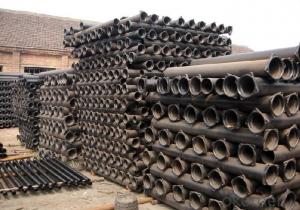Ductile Iron Pipe of China On Sale DN100-DN500 EN545
- Loading Port:
- China main port
- Payment Terms:
- TT or LC
- Min Order Qty:
- 20 m.t.
- Supply Capability:
- 50000 m.t./month
OKorder Service Pledge
OKorder Financial Service
You Might Also Like
1,Ductile Iron Pipe Description :
1) Pipes confirm to ISO2531,K9 class,T type joint,6m long,with inside cements lining conform to ISO4179,
outside Zinc spraying(130g/m2) and bitumen coating(70μm) conform to ISO8179.
2) Pipe ends: Spigot and socket ends, with 100% SBR rubber gaskets accoding to ISO4633
3) we can do third party inspection according to customer's request.
4) Our products have been sold to many international market,such as Middle East and South East Asia and Africa.
2,Main Features of the Ductile Iron Pipe:
1. Material: Ductile iron grade 500-7/ 450-10 in accordance with ISO1083
2. Standard: ISO 2531, EN545, EN598, ANSI, AWWA
3. Certificate: ISO9001, ISO14001, SGS, NSF, WRAS
4. Test: In accordance with ISO 2531 / EN 545 / EN598 and 100% water pressure test
5. Length: 6m or cut into 5.6m, 5.7m, 5.8m
3,Ductile Iron Pipe Images:
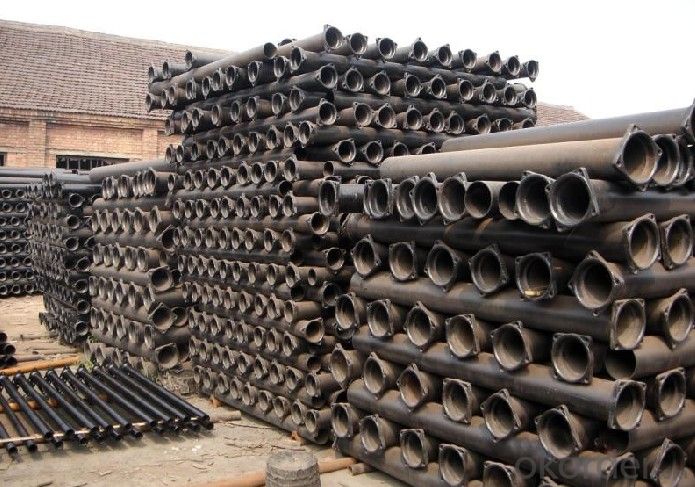
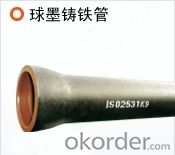
4. Ductile Iron Pipe Specification
Quick Details
Place of Origin: China (Mainland)
Model Number: DN80-1600 Length: 6M/5.7M/NEGOTIATED Standard: ISO2531 / EN545
Application: Potable/Sewage Water
Diameter: DN80-1600
Shape: Round
Hardness: 230 Pipe
Wall Thickness: standerd
Pull Strength: 420
Yield (≥ MPa): 300
Material: Ductile Iron water ductile iron pipe: SO2531 / EN545 DI pipe
Packaging & Delivery
Delivery Detail: 30-45 days
ductile iron pipe:
1. DN80-DN1600mm (T-Type, Class K9)
2.effective length 6m/pc
3.comply with ISO2531/EN545/EN598
5.FAQ:
We have organized several common questions for our clients,may help you sincerely:
1.Q: Why would you choose ductile iron pipe rather than other pipe materials?
A:The reasons are obvious for that not only ductile iron pipe possesses the inherent strength and flexibility of ductile iron, combined with proven corrosion protection systems, but also the cost savings can be achieved from design to installation and commissioning.
2.Q:Why can you guarantee the inner of pipes can’t be corroded?
A: High alumina cement mortar lining and sulphate-resistant cement mortar lining. These two special linings are applicable to inner anti-corrosion for sewage pipes, improving resistance to erosion of the sewage components.
- Q: What are the different methods for joining ductile iron pipe?
- There are several methods for joining ductile iron pipe, each with its own advantages and limitations. One common method is mechanical joint (MJ) coupling, which involves using a rubber gasket and a set of bolts and nuts to create a watertight seal between pipe sections. This method is relatively quick and easy to install, but it requires a skilled technician to ensure proper alignment and bolt tightening to prevent leakage. Another method is flanged joint, where the pipe ends are equipped with flanges that are bolted together using gaskets to create a tight seal. This method allows for easy disassembly and reassembly of pipe sections, making it suitable for applications that require frequent maintenance or modifications. However, it is more expensive and time-consuming compared to other methods. One widely used method is push-on joint (POJ), which involves using a rubber gasket and a special lubricant to slide the pipe ends together. This method provides a reliable and watertight seal, and it is relatively quick and easy to install. However, it requires proper alignment and care to avoid damaging the gasket during assembly. Another option is restrained joint (RJ), which uses a mechanical joint coupling with additional features to resist axial forces or thrusts. This method is commonly used in applications where the pipe is subject to internal pressure, external loads, or seismic activity. It provides a secure and rigid connection but may require specialized tools and training for installation. Finally, welding is another method for joining ductile iron pipe. It involves heating the pipe ends and melting a filler metal to create a permanent bond. This method provides a strong and durable connection, but it requires skilled welders and additional time for preparation, welding, and cooling. Welding is often used for specific applications, such as joining sections of pipe with different diameters or connecting to other materials. In summary, the different methods for joining ductile iron pipe include mechanical joint coupling, flanged joint, push-on joint, restrained joint, and welding. The choice of method depends on factors such as the application requirements, installation time, maintenance needs, and budget.
- Q: Can ductile iron pipe be used for both water and wastewater applications?
- Yes, ductile iron pipe can be used for both water and wastewater applications. Ductile iron is a type of iron that has been treated with small amounts of magnesium to create a more flexible and durable material. This makes it suitable for transporting both water and wastewater. Ductile iron pipes are known for their high strength and resistance to corrosion, making them ideal for underground applications. They can handle the high pressures and varying flow rates associated with water distribution systems, as well as the corrosive nature of wastewater. Additionally, ductile iron pipes have a longer lifespan compared to other materials commonly used in water and wastewater applications, such as PVC or concrete. Therefore, they are often chosen for projects that require a reliable and long-lasting pipe material for both water and wastewater transport.
- Q: How do ductile iron pipes perform in high-altitude areas?
- Due to their inherent strength and durability, ductile iron pipes are highly effective in high-altitude regions. The exceptional properties of ductile iron, such as its high tensile strength and impact resistance, make it ideal for withstanding the challenges presented by high-altitude environments. One significant advantage of ductile iron pipes is their ability to endure both internal and external pressures. In areas with varying water pressure, these pipes can withstand such fluctuations without compromising their structural integrity. This guarantees a consistent and uninterrupted flow of water, eliminating the risk of pipe failures or leaks. Furthermore, ductile iron pipes possess excellent resistance against corrosion, which is crucial in high-altitude areas with unpredictable and harsh atmospheric conditions. The protective lining and external coatings of these pipes provide an additional layer of defense, ensuring their durability and reducing the need for frequent maintenance or replacements. Additionally, ductile iron pipes have a higher tolerance for temperature variations compared to other materials. In high-altitude regions where temperature fluctuations can be extreme, these pipes can withstand expansion and contraction without cracking or rupturing. This thermal stability is vital for maintaining the integrity of the pipeline system and preventing costly repairs. To summarize, ductile iron pipes are an ideal choice for high-altitude areas due to their strength, durability, resistance to pressure variations, corrosion resistance, and thermal stability. These properties make them a reliable option for water distribution systems in such environments, ensuring a continuous water supply without compromising safety or efficiency.
- Q: Are ductile iron pipes suitable for bridge piers or abutments?
- Yes, ductile iron pipes are suitable for bridge piers or abutments. Ductile iron is known for its high strength and durability, making it a reliable choice for supporting heavy loads in bridge construction. Additionally, ductile iron pipes are corrosion-resistant, which is crucial for structures exposed to moisture and environmental factors.
- Q: How does ductile iron pipe perform in areas with high groundwater salinity?
- Ductile iron pipe performs well in areas with high groundwater salinity due to its inherent corrosion resistance properties. The high levels of salinity in the groundwater can cause corrosion and deterioration of certain materials, but ductile iron is highly resistant to this type of corrosion. Its composition and manufacturing process make it less susceptible to damage from corrosive elements, such as salt and minerals present in high salinity water. The corrosion resistance of ductile iron pipe is primarily attributed to its protective iron oxide coating, which forms naturally on the interior and exterior surfaces of the pipe. This coating acts as a barrier, preventing direct contact between the pipe and the corrosive elements in the groundwater. Additionally, ductile iron pipes are often lined with cement mortar or a protective epoxy coating, which further enhances their resistance to corrosion and provides an additional layer of protection. Furthermore, ductile iron pipe has a long lifespan, often exceeding 100 years, which makes it ideal for areas with high groundwater salinity. Its durability and resistance to corrosion ensure that it can withstand the harsh conditions associated with high salinity environments, minimizing the need for frequent repairs or replacements. In summary, ductile iron pipe is an excellent choice for areas with high groundwater salinity due to its corrosion resistance properties. Its protective iron oxide coating, coupled with optional linings, provides a reliable and long-lasting solution, ensuring the integrity and performance of the pipe system even in challenging environments.
- Q: Can ductile iron pipe be used for wastewater treatment plant sludge handling?
- Yes, ductile iron pipe can be used for wastewater treatment plant sludge handling. Ductile iron pipes are known for their durability, corrosion resistance, and ability to withstand heavy loads, making them suitable for handling sludge in wastewater treatment plants.
- Q: Are ductile iron pipes suitable for use in chemical processing plants?
- Yes, ductile iron pipes are suitable for use in chemical processing plants. Ductile iron is known for its high strength and durability, making it resistant to corrosion and capable of withstanding high pressure and extreme temperatures. Additionally, its smooth internal surface reduces friction and allows for efficient flow of chemicals.
- Q: Are ductile iron pipes suitable for installation in rocky or hard soil conditions?
- Yes, ductile iron pipes are suitable for installation in rocky or hard soil conditions. Ductile iron has excellent strength and durability, making it highly resistant to external pressures and impacts. It can withstand the challenges posed by rocky or hard soils, ensuring reliable and long-lasting performance.
- Q: What is the average cost of ductile iron pipe?
- The average cost of ductile iron pipe can vary depending on factors such as the size, length, and location. However, as of 2021, the average cost for ductile iron pipe ranges from $10 to $20 per linear foot.
- Q: Can ductile iron pipes be used in tunneling or microtunneling projects?
- Yes, ductile iron pipes can be used in tunneling or microtunneling projects. Ductile iron pipes are known for their strength, durability, and flexibility, making them suitable for underground applications. They can withstand the external pressure exerted by the surrounding soil or rock during tunneling, ensuring the integrity and safety of the project. Additionally, ductile iron pipes have excellent corrosion resistance properties, which is crucial in tunneling projects where the pipes are exposed to moisture and other corrosive elements. Their smooth internal surface also facilitates the flow of fluids or materials through the pipes, making them an ideal choice for tunneling or microtunneling projects.
Send your message to us
Ductile Iron Pipe of China On Sale DN100-DN500 EN545
- Loading Port:
- China main port
- Payment Terms:
- TT or LC
- Min Order Qty:
- 20 m.t.
- Supply Capability:
- 50000 m.t./month
OKorder Service Pledge
OKorder Financial Service
Similar products
Hot products
Hot Searches
Related keywords
